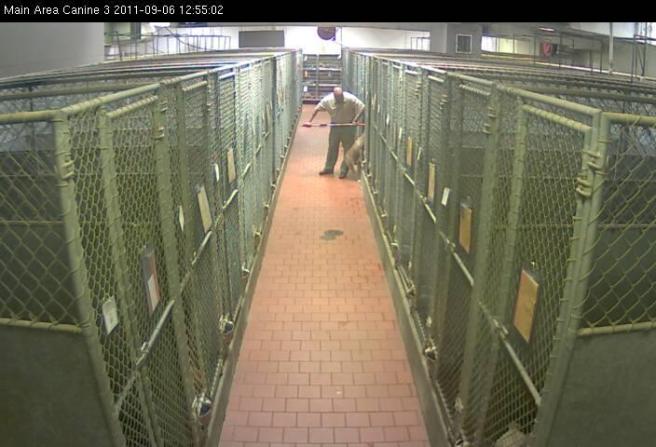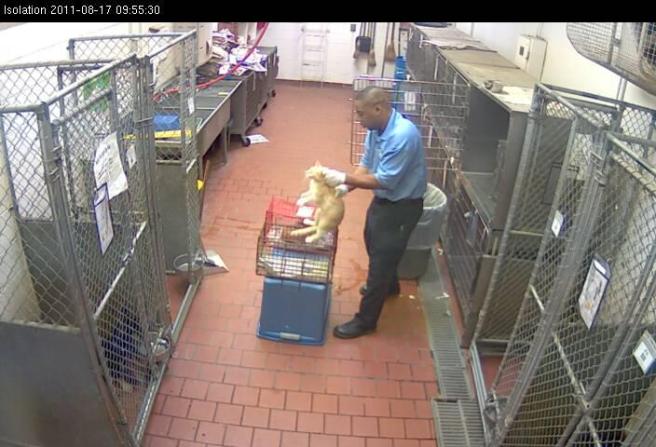In the decade since 9/11, there have been many tributes to the heroic SAR dogs and handlers who worked tirelessly in the weeks following the attack, searching for victims. Their efforts helped bring peace to many families who lost loved ones on that awful day. In addition to those valuable SAR teams, there were also more than 300 therapy dog and handler teams who did important work at Ground Zero during that time. Sometimes referred to as comfort dogs or crisis dogs, these trained pets provide an essential service which only they can. One of the comfort dogs who worked the long and draining days on Pier 94 was a Keeshond named Tikva:
At Ground Zero, Tikva’s presence helped to ease the anxieties of the overwhelmed rescue workers. Many of them would pet her while on break from searching the rubble.
“Some of them never said a word all day, but would turn around at the end of the day and ask, ‘Can you bring her again tomorrow?'” recalled Tikva’s handler, Cindy Ehlers, who runs the K9 CRT disaster response team at Pawsitive Pet, in Eugene, Ore.
Any pet owner can tell you about the singular comfort they receive from their pets. Our dogs and cats are not only a source of unconditional love but they possess a unique ability to understand us on a basic emotional level. This unspoken communication often manifests in a subtle yet undeniable form which saves people’s lives. Is it possible to overstate the significance and value of this truth?
And yet, in cities like Memphis and NYC itself, pets within the municipal “shelter” system are being abused and needlessly killed every day, regarded as disposable commodities. How can we reconcile this? Whether you believe in pet overpopulation or not, whether you are willing to follow examples set by successful no kill communities or not, the abuse and killing of healthy/treatable pets is never justifiable. Pets exist because we domesticated them for our use as companions and for the services they provide. They are completely at our mercy. The responsibility to protect them from harm lies solely with us.
There is a crisis currently affecting compassionate people and homeless pets all over this country: the abuse and needless killing happening in our public “shelter” system. Of course this isn’t a singular event type of tragedy such as would warrant a call to therapy dog teams. But does it pain you, as it does me, to think that those comfort dog teams are on standby to help us when we need it? I know many advocates rely upon their own pets to provide similar type services when circumstances dictate. Is the comparison between who we call upon in a crisis to comfort us and who we as a society throw into dumpsters in places like MAS and NYCACC enough to motivate you to step up your game?
Pets save human lives in ways that nothing else in this world can. What comfort are we providing them during our crisis of humanity?



Wow, very powerful and though provoking essay. Thank you!
LikeLike
The part about the comfort dog Tikva brought tears to my eyes. <3
We chat on twitter now and then and I always read your blog, very inspiring. @thecraftafarian
LikeLike
Great post Shirley. I’ve been thinking a lot about this sort of thing recently and from the little I’ve read and witnessed so far I think it works the opposite way too. Killing and abusing healthy animals, especially on a regular long term basis such as in a high kill shelter or in an abbatoir or on a farm, appears to be harmful to humans (not saying all farmers are animal abusers/killers btw- it’s just an environment that often results in animal abuse). It seems to twist something in us so we either end up depressed and traumatised or apathetic/numb. People who abuse animals often go on to abuse humans (particularly children). I’m not sure if anyone’s already done some research on this but even without research, surely common sense would say where the majority of humans can’t complete a task for an extended period of time without being adversely affected psychologically, then the task is psychologically damaging to humans and should cease.
LikeLike
It all starts with the people. If you have a compassionate Director that loves animals and does not accept euthanization as solution then you already saved mist animals. Besides of a compassionate Director, you also need a group of compassionate people that want to take care of animals and don’t just see it as a job. If I would seesomebody in our Shelter not caring for animals in a respectful and compassionate manner, he or she would be kicked out the door immediately.
LikeLike